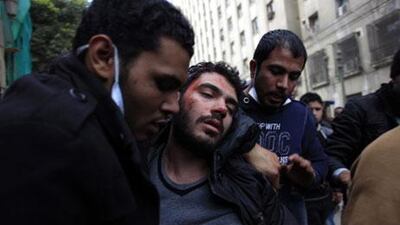CAIRO // At least four people were killed and more than a hundred people were injured in clashes with security forces in Cairo, Alexandria and other cites yesterday as Egyptians protested on the second anniversary of the uprising that toppled Hosni Mubarak's regime.
The dead included a 14-year-old boy. The day's worst clashes were in the city of Suez, where protesters set ablaze a building that once housed the city's local government.
A Muslim Brotherhood office was also torched during the nationwide demonstrations.
Those taking part in the protests say Mohammed Morsi's Islamist government has both failed to embrace democracy and improve the country's dire economic outlook.
On a street near Tahrir Square, the centre of the 2011 protests that eventually forced Mubarak to resign the presidency after nearly three decades in power, young men threw rocks and Molotov cocktails at police over two concrete walls built to stop confrontations.
Some of the men wore black masks because they feared revealing their identities would put them at risk of future arrest. Some police threw rocks back and fired tear-gas canisters.
Down the street, protesters chanted "Morsi Mubarak", a conflation of Mr Morsi, the former Brotherhood official who became president in June, and Mubarak, his unpopular predecessor.
"The feeling in Tahrir is disappointment," said Ola Abbas, 32, a member of the liberal Dostour Party, who said she and her colleagues would take turns occupying a tent in the square for at least a month to protest against the new regime.
"Nothing has changed in two years," she said. "It only got worse. We aren't asking for democracy. We are asking for our rights, for a free country. What we have couldn't be farther from that."
In Ismailia, black smoke could be seen coming out of the windows of the apartment housing the Brotherhood's Freedom and Justice Party offices.
The Islamist group said protesters also tried to storm one of its offices in the Cairo district of Tawfikiya.
But the Brotherhood did not call on its members to demonstrate. Instead, they planted a number of trees to commemorate the uprising, painted decrepit walls around the city and sold discounted vegetables in poor neighbourhoods.
The disparate activities of the supporters and opponents of Mr Morsi revealed in stark terms the persistent polarisation in the country two years after Mubarak was forced out of power.
Mr Morsi was elected by a thin margin, boosted by liberals and revolutionaries who saw him as a better choice than Mubarak's former prime minister, Ahmed Shafiq.
But support for him has steadily eroded as the country's economic situation worsened and the president pushed through a referendum on a controversial constitution. It passed in December with 63.8 per cent of the vote, but also left a significant portion of the country feeling that the president was trying to cement the Brotherhood's hold on power.
On Thursday night, in a speech to commemorate the Prophet Mohammed's birthday, Mr Morsi blamed the country's problems on a conspiracy by former members of the Mubarak regime and urged Egyptians to unite in a nationwide rebuilding effort.
"The counter-revolution is being led by remnants of ousted president Hosni Mubarak's regime to obstruct everything in the country," he said, according to the state-run Al Ahram newspaper.
"The revolution was a turning point in Egypt's history," he said. "Egyptians have achieved unlimited freedoms and a constitution that reduced the president's powers."
But in Tahrir, many expressed distrust for the president's statements and vowed to oppose the Brotherhood's Freedom and Justice Party in parliamentary elections expected to be held in April.
"We kicked out a dictatorship by the National Democratic Party, but now we have a new one," said Mustafa Darwish, 25, as he fingered prayer beads.
"Where is the revolution if each person can barely get three pieces of bread a day?," he said. "There is no social justice. We have even less now than before."
Mohammed Saad, 55, a contractor who can only find work by the day, jumped in. "The Brotherhood are infiltrating every joint of the government," he said. "They have no problem getting jobs now. Now that they are in power, they are placing their people everywhere. We are left with nothing."
As Mr Darwish and Mr Saad spoke, a group of young men in masks marched toward the front line of the clashes down the road with a drummer beating a warlike rhythm. One of their members, a 25-year-old who wore a black balaclava and refused to give his name, gave a grim warning.
"We have asked for our freedom and they are shooting at us with tear gas," he said, describing how the fight broke out the night before because they were attempting to dismantle a 15-foot wall made of concrete blocks. "They create the chaos, but we will use their reactions against them. We will use the chaos to topple their regime just like the last one."
bhope@thenational.ae

